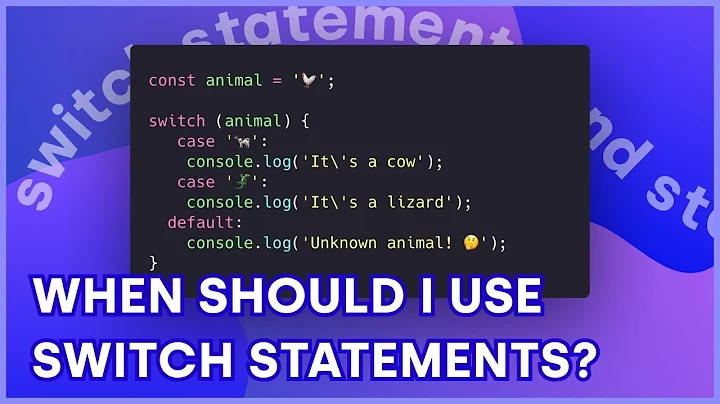Javascript switch vs. if...else if...else
Solution 1
Answering in generalities:
- Yes, usually.
- See More Info Here
- Yes, because each has a different JS processing engine, however, in running a test on the site below, the switch always out performed the if, elseif on a large number of iterations.
Solution 2
Sometimes it's better to use neither. For example, in a "dispatch" situation, Javascript lets you do things in a completely different way:
function dispatch(funCode) {
var map = {
'explode': function() {
prepExplosive();
if (flammable()) issueWarning();
doExplode();
},
'hibernate': function() {
if (status() == 'sleeping') return;
// ... I can't keep making this stuff up
},
// ...
};
var thisFun = map[funCode];
if (thisFun) thisFun();
}
Setting up multi-way branching by creating an object has a lot of advantages. You can add and remove functionality dynamically. You can create the dispatch table from data. You can examine it programmatically. You can build the handlers with other functions.
There's the added overhead of a function call to get to the equivalent of a "case", but the advantage (when there are lots of cases) of a hash lookup to find the function for a particular key.
Solution 3
The performance difference between a switch and if...else if...else is small, they basically do the same work. One difference between them that may make a difference is that the expression to test is only evaluated once in a switch while it's evaluated for each if. If it's costly to evaluate the expression, doing it one time is of course faster than doing it a hundred times.
The difference in implementation of those commands (and all script in general) differs quite a bit between browsers. It's common to see rather big performance differences for the same code in different browsers.
As you can hardly performance test all code in all browsers, you should go for the code that fits best for what you are doing, and try to reduce the amount of work done rather than optimising how it's done.
Solution 4
Pointy's answer suggests the use of an object literal as an alternative to switch or if/else. I like this approach too, but the code in the answer creates a new map object every time the dispatch function is called:
function dispatch(funCode) {
var map = {
'explode': function() {
prepExplosive();
if (flammable()) issueWarning();
doExplode();
},
'hibernate': function() {
if (status() == 'sleeping') return;
// ... I can't keep making this stuff up
},
// ...
};
var thisFun = map[funCode];
if (thisFun) thisFun();
}
If map contains a large number of entries, this can create significant overhead. It's better to set up the action map only once and then use the already-created map each time, for example:
var actions = {
'explode': function() {
prepExplosive();
if( flammable() ) issueWarning();
doExplode();
},
'hibernate': function() {
if( status() == 'sleeping' ) return;
// ... I can't keep making this stuff up
},
// ...
};
function dispatch( name ) {
var action = actions[name];
if( action ) action();
}
Solution 5
Other than syntax, a switch can be implemented using a tree which makes it O(log n), while a if/else has to be implemented with an O(n) procedural approach. More often they are both processed procedurally and the only difference is syntax, and moreover does it really matter -- unless you're statically typing 10k cases of if/else anyway?
Related videos on Youtube
Comments
-
John Hartsock about 4 years
Guys I have a couple of questions:
- Is there a performance difference in JavaScript between a
switchstatement and anif...else? - If so why?
- Is the behavior of
switchandif...elsedifferent across browsers? (FireFox, IE, Chrome, Opera, Safari)
The reason for asking this question is it seems that I get better performance on a
switchstatement with approx 1000s cases in Firefox.
Edited Unfortuantly this is not my code the Javascript is being produced serverside from a compiled library and I have no access to the code. The method that is producing the javascript is called
CreateConditionals(string name, string arrayofvalues, string arrayofActions)note
arrayofvaluesis a comma separated list.what it produces is
function [name] (value) { if (value == [value from array index x]) { [action from array index x] } }Note: where
[name]= the name passed into the serverside functionNow I changed the output of the function to be inserted into a TextArea, wrote some JavaScript code to parse through the function, and converted it to a set of
casestatements.finally I run the function and it runs fine but performance differs in IE and Firefox.
-
jcolebrand about 14 yearsI would suggest a code sample to examine what's optimal. I mean, there's gotta be a reason you're asking this, right?
-
Pointy about 14 yearsPlease post what you're up to, because there are very few cases in my long experience for which I'd say a 100-case switch statement or a 100-part if/else series was a good idea.
-
John Hartsock about 14 yearssorry guys not 100s but thousands of conditions
-
John Hartsock about 14 yearsEveryone, thanks for the input. But my problem wasnt actually the difference between the if and swith statments. It was the code running inside the statement. +1 to all of you for your help. Sorry for the inconvienience. Sometimes you just need to talk things out with another person to find the solution.
- Is there a performance difference in JavaScript between a
-
jball about 14 yearsIn javascript especially, the semantics and readability (and therefore the maintainability) trump any localized performance differences between
if..elseandswitchcaused by a unique browser version computer hardware and OS combination. -
ghoppe about 14 yearsI don't know if I agree, it might indeed be noticed if it is used in a loop with say, a large database, traversing a tree etc.
-
John Hartsock about 14 yearsThanks tommy your example site was nice to use when trying to determine what the performance difference was between if and switch. Its so minimal it led me to the conclusion that my problem was elsewhere, as I noted in my comment with my question. Thanks for your time.
-
joshvermaire over 12 yearsi definitely disagree. as web applications become more and more complex, this difference could be significant for the application and could change dependent on browsers.
-
 Arpit Arya over 12 yearsThe important thing is to write clean, maintainable code. When a performance issue is seen - profile. Then determine which code to fix. Don't sacrifice maintainability for assumed performance issues.
Arpit Arya over 12 yearsThe important thing is to write clean, maintainable code. When a performance issue is seen - profile. Then determine which code to fix. Don't sacrifice maintainability for assumed performance issues. -
dragonroot about 12 years'if else if else ...' is O(n), while 'switch' is either O(1) or O(log(n)). How can you honestly state the difference can never be large enough? Have a million of cases in switch (easily possible if the code is generated) and you'll definitely notice it to say the least.
-
 Arpit Arya about 12 years@dragonroot, the performance of if and switch is completely dependant on the implementation of the JavaScript engine. There's no guarantee that if/else is O(n) and switch is O(1) or O(log(n)) in all engines. As I said before, you cannot assume performance issues. They have to be discovered with profiling, especially with something small like an if/else vs switch statement.
Arpit Arya about 12 years@dragonroot, the performance of if and switch is completely dependant on the implementation of the JavaScript engine. There's no guarantee that if/else is O(n) and switch is O(1) or O(log(n)) in all engines. As I said before, you cannot assume performance issues. They have to be discovered with profiling, especially with something small like an if/else vs switch statement. -
dragonroot about 12 years@Jon Benedicto, 'switch' was specifically designed to be easily implementable faster than O(n) - its syntax is not just syntactic sugar. 'if's were supposed to be evaluated one after another, on the other hand.
-
 Jonathan Tonge over 11 yearsIf you have calculations that are not time sensitive than sure - go for what you can read best. However, if you are going through large sets of data, or running intense calculations continuously, than you should care less about readability and instead look for what is most CPU friendly. I do believe switch statements are faster still in many circumstances but in others, not as fast.
Jonathan Tonge over 11 yearsIf you have calculations that are not time sensitive than sure - go for what you can read best. However, if you are going through large sets of data, or running intense calculations continuously, than you should care less about readability and instead look for what is most CPU friendly. I do believe switch statements are faster still in many circumstances but in others, not as fast. -
 edhedges about 11 yearsIf you want a TLDR of when to use which conditionals here is a direct link to a segment in the article addressing that: oreilly.com/server-administration/excerpts/even-faster-websites/…
edhedges about 11 yearsIf you want a TLDR of when to use which conditionals here is a direct link to a segment in the article addressing that: oreilly.com/server-administration/excerpts/even-faster-websites/… -
Jasper about 11 years@Tommy Good article, thanks for sharing. However the article states that there is a negligible performance difference between
switchandif/thenstatements in JS. The article states this is due to spottyswitchoptimization and the different ways different JS engines function. Quote:Since most JavaScript engines don’t have such optimizations, performance of the switch statement is mixed. -
 Tommy about 11 years@Jasper, thanks! But, I wanted to point out from the O'Reily article it also states: ...if statements are generally faster than switch statements when there are just one or two conditions to be evaluated. When there are more than two conditions, and the conditions are simple (not ranges), the switch statement tends to be faster. This is because the amount of time it takes to execute a single condition in a switch statement is often less than it takes to execute a single condition in an if statement, making the switch statement optimal only when there are a larger number of conditions.
Tommy about 11 years@Jasper, thanks! But, I wanted to point out from the O'Reily article it also states: ...if statements are generally faster than switch statements when there are just one or two conditions to be evaluated. When there are more than two conditions, and the conditions are simple (not ranges), the switch statement tends to be faster. This is because the amount of time it takes to execute a single condition in a switch statement is often less than it takes to execute a single condition in an if statement, making the switch statement optimal only when there are a larger number of conditions. -
 Tommy about 11 years@Jasper - And agreed, it isn't rock solid conclusion, but that's why I mentioned I was answering in generalities:)
Tommy about 11 years@Jasper - And agreed, it isn't rock solid conclusion, but that's why I mentioned I was answering in generalities:) -
thatmiddleway over 10 yearsI downvoted this because I think the generalization made in answer to the first question is incorrect.
-
NiCk Newman almost 9 years
switch is useful/short if you want prevent multiple if-else conditions.Yes sir, great post. -
Thomson Comer over 8 yearsIs anything quantifiable shown in this description? It reads like a lot of "best practices/premature optimization" conjecture. It was also written 7 years ago, so javascript optimizations have changed tremendously in this time. In compiled languages, the performance difference between these three operations is "almost never significant enough to care". Don't bother optimizing things that won't affect actual performance. Optimize readability.
-
 Tommy over 8 years@ThomsonComer - those are valid points but I am not sure what do about it from my perspective? Thats not a snarky comment, but rather, a solicitation of input - do you have a suggestion on how to improve this answer 7 years later?
Tommy over 8 years@ThomsonComer - those are valid points but I am not sure what do about it from my perspective? Thats not a snarky comment, but rather, a solicitation of input - do you have a suggestion on how to improve this answer 7 years later? -
Thomson Comer over 8 yearsWell, for the first time in just about that long, I found myself asking the same as the original question. After seven years, I feel like a voice saying, "Don't premature optimize" isn't unreasonable. Especially for junior level programmers, this is not the kind of question you need to be worrying yourself with. :) Your answer is solid.
-
Ed Staub over 7 years7 years later... I don't see how tree implementation is possible, except in a the case of constant numerical case values).
-
 Neonit about 6 yearsTest gives me infinity for some cases, probably because it optimizes away empty statements. I tried to make a new revision – actually I added two, but they have no test cases. I don't know why it won't save my changes. It just tells me sometimes not all test cases were saved or to review some fields it doesn't mark for me in any way. I guess the internet needs a new performace testing site.
Neonit about 6 yearsTest gives me infinity for some cases, probably because it optimizes away empty statements. I tried to make a new revision – actually I added two, but they have no test cases. I don't know why it won't save my changes. It just tells me sometimes not all test cases were saved or to review some fields it doesn't mark for me in any way. I guess the internet needs a new performace testing site. -
LogicDaemon over 5 years@Tommy «See More Info Here» gives 404, what was there?
-
 Tommy over 5 years@LogicDaemon - IIRC is was a link to some oRielly textbox that got into some indepth JS performance considerations / discussions
Tommy over 5 years@LogicDaemon - IIRC is was a link to some oRielly textbox that got into some indepth JS performance considerations / discussions -
FINDarkside over 5 yearsAs you can see form the browserscope stats, your claim that
switchis faster is not true. Please modify your answer or the benchmark. -
 Tommy over 5 yearsAs I look at the most recent version of the test (revision 10 - jsperf.com/switch-case-vs-if-else/10), it has additional cases added after the revisions with only 3 cases. Seems with 10 cases, the switch kills if/else especially on newer versions of Chrome (>70). This shows that your mileage may vary in usage scenarios but I still have never found an instance where switch is significantly slower than if/else (whereas Ive seen the opposite on current metrics) so I still feel confident in saying "yes, usually there is a performance difference" and typically, the switch is faster.
Tommy over 5 yearsAs I look at the most recent version of the test (revision 10 - jsperf.com/switch-case-vs-if-else/10), it has additional cases added after the revisions with only 3 cases. Seems with 10 cases, the switch kills if/else especially on newer versions of Chrome (>70). This shows that your mileage may vary in usage scenarios but I still have never found an instance where switch is significantly slower than if/else (whereas Ive seen the opposite on current metrics) so I still feel confident in saying "yes, usually there is a performance difference" and typically, the switch is faster. -
 Daniel Santana over 5 yearsYour strategy is good and I use it oftenly. But as pointed by @Michael Geary stackoverflow.com/a/45336805/5936119, the map variable must be declared outside the dispatch context otherwise it will always be re-evaluated.
Daniel Santana over 5 yearsYour strategy is good and I use it oftenly. But as pointed by @Michael Geary stackoverflow.com/a/45336805/5936119, the map variable must be declared outside the dispatch context otherwise it will always be re-evaluated. -
Pointy over 5 years@DanielSantana true but I doubt that's significantly expensive. In particular, once a function is initially parsed the code itself need not be regenerated, as the text is static.
-
 etoxin almost 5 yearsi've just added one with 10 cases. jsperf.com/switch-case-vs-if-else/24 And it appears that they are so close in terms of performance, They are within <1% of each other (they are all marked "fastest"). It comes down to preferred syntax.
etoxin almost 5 yearsi've just added one with 10 cases. jsperf.com/switch-case-vs-if-else/24 And it appears that they are so close in terms of performance, They are within <1% of each other (they are all marked "fastest"). It comes down to preferred syntax. -
 oldboy over 4 yearsweird. it actually says
oldboy over 4 yearsweird. it actually saysif-else againwas the fastest -
 Tommy over 4 years@oldboy - I mean it is a 10 year old answer and JS engines have been greatly improved / modified / changed in those 10 years. :) IMHO, It is still both browser dependent as well as "function" dependent, meaning, number of cases, amount of work in comparisons, etc.
Tommy over 4 years@oldboy - I mean it is a 10 year old answer and JS engines have been greatly improved / modified / changed in those 10 years. :) IMHO, It is still both browser dependent as well as "function" dependent, meaning, number of cases, amount of work in comparisons, etc. -
 oldboy over 4 yearsi think the single rule of thumb is simply to reduce calculations and repetition in order to increase performance. hence
oldboy over 4 yearsi think the single rule of thumb is simply to reduce calculations and repetition in order to increase performance. henceswitchmust be more efficient when youre evaluating the same value repeatedly (i.e.v === 1 else if v === 2 else if v === 3 else if, etc), generally speaking. -
trollkotze over 3 years3.5 years later... @Ed Staub Of course that is the case here. Switch statements work with constants. Wether already numbers or whatever, they can be enumerated, so a tree can be constructed.
-
Ed Staub over 3 years@trollkotze While constants are most common, case clauses can be any expression. See e.g. stackoverflow.com/questions/3463833/….
-
trollkotze over 3 yearsOh, I didn't know that. It's not possible in C, afaik. Only constant expressions allowed there. So I assumed it to be the same in JS.
-
2540625 almost 3 yearsJS Perf is no longer functionally, sadly.
-
 Envayo about 2 yearsThis is the answer I did not come looking for, but accepted as the definitive answer to my long-lasting "if vs switch" inner debate.
Envayo about 2 yearsThis is the answer I did not come looking for, but accepted as the definitive answer to my long-lasting "if vs switch" inner debate.








